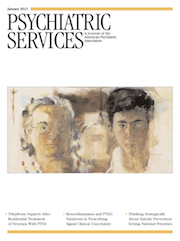Medicaid programs have experienced considerable growth in antipsychotic prescribing, particularly of second-generation antipsychotic agents. As the use of antipsychotic medications has grown, so too has evidence about the effectiveness, appropriateness, and safety of these treatments in pediatric populations. A major concern is metabolic abnormalities, which have been shown to be poorly monitored for children who take antipsychotics. Combined with concerns regarding antipsychotic use for conditions where there is limited long-term evidence-based support, many Medicaid programs have restricted antipsychotic utilization in the pediatric population. Restrictive policies, such as prior-authorization requirements, may reduce spending for antipsychotic treatment but may also present a barrier to patients who need antipsychotic treatment for approved purposes, restrict provider choice of treatment, and fail to address issues of safety, including metabolic monitoring.
In the face of concerns regarding existing Medicaid policies to improve antipsychotic prescribing, the state of North Carolina recently implemented A+KIDS (Antipsychotics + Keeping It Documented for Safety), a novel program in that it retains access to antipsychotic treatments and provider choice in the prescribing process but uses a medication registry to document aspects of prescribing. The primary goals of A+KIDS are to discourage unnecessary prescribing, to improve safety monitoring by educating providers and providing feedback about prescribing, and to minimize disruption to patient, caregiver, or prescriber. Key principles of A+KIDS are to be transparent and evidence based; to include involvement by all stakeholders, including professional associations, advocacy groups, mental health departments, and pharmacy representatives; to preserve open access to all antipsychotics; and to encourage best-practices monitoring for adverse effects.
A+KIDS was implemented in collaboration with Community Care of North Carolina, a managed care collaborative group with 1,500 medical home practices across the state. This infrastructure allowed for significant education to prepare providers and pharmacists for the A+KIDS implementation. In addition, a call center was available 40 hours a week to assist with registration, prescription denials, and problems.
A key feature of A+KIDS is the use of an online documentation tool (registry) for providers to register patients, track antipsychotic treatment, and document safety monitoring. A+KIDS was phased into use in three separate stages to minimize disruption. Provider registration began March 14, 2011, to collect information about provider specialty and practice characteristics. This was done in advance to ensure provider registration and allow for outreach to high-frequency providers most affected by the registry. Beginning April 12, 2011, the system began to capture clinical information for children age 12 and younger. Finally, on August 24, 2011, the system was released to capture safety monitoring data and open the program to adolescents ages 13 to 17.
A+KIDS is unique from traditional prior-authorization policies in that it does not restrict access to specific antipsychotic treatments or clinical conditions. The only criterion followed in the authorization process is prescriber entry of clinical and safety information. During initial prescribing, providers are asked to enter patient characteristics, the prescribed medication, the symptom targeted, and the primary diagnosis for treatment. Safety monitoring data collected by A+KIDS for patients who have received six months of treatment or longer include weight and height, potential daytime sedation, blood glucose monitoring, and lipid screening. Neurological side effects, including tremors, muscle stiffness, restlessness, and involuntary muscle movements, are also documented. Clinical and safety information is requested to be updated every six months for patients using antipsychotics for off-label conditions and annually for patients with U.S. Food and Drug Administration–approved indications. Prescribers maintain their ability to use clinical judgment as to whether a monitoring test is necessary and may use the tool to monitor patient progress. They have the option of stating that the monitoring is not clinically indicated and allowing a patient’s family or guardian the choice to deny monitoring.
Traditional prior-authorization programs provide too blunt an instrument for managing a complex process in the prescribing of antipsychotic treatments. Novel approaches to improving evidence-based prescribing and monitoring of clinical safety for antipsychotic treatments are necessary to improve care. Preliminary monitoring of prescription dispensing in the North Carolina Medicaid population suggests a noticeable decline in antipsychotic prescribing to pediatric patients. Further program evaluation is planned to better understand the appropriateness of these declines and the potential for disruptions in patient care. In addition, an analysis will be conducted to determine the program’s overall impact on cost savings. As Medicaid programs struggle with the complexity of this issue, the A+KIDS program provides a unique approach to improving antipsychotic prescribing in the pediatric population.

